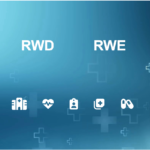- Real-World Data & Analytics
- Artificial Intelligence
- Health Economics & Outcome Research
- Market Access & Reimbursement
At the heart of modern healthcare lies Real World Data (RWD)—a treasure trove of information relating to patient health status and the delivery of healthcare.
RWD is routinely collected from a variety of sources, including Electronic Health Records (EHR), medical claims and billing activities, product and disease registries, and even wearable devices. The true value of RWD lies in its ability to complement clinical trial data. By providing real-world perspectives on a diverse patient population, treatment regimens, long-term efficacy and safety, and healthcare costs, RWD empowers evidence-based decision-making in healthcare. This makes it an invaluable tool in post-launch studies and outcome research.
Our team, equipped with strong academic and industrial experience, helps our clients identify the right data, assure data quality, develop statistical methods, build visualization dashboards, publish scientific findings, and identify missed opportunities of improved patient care.
In the 2020s, the world witnessed an unprecedented boom in Artificial Intelligence (AI). This was fueled by powerful computer hardware, the availability of immense data sets, and innovative neural network-based algorithms. These advancements led to the development of extraordinary machine learning applications that captivated the world.
However, this rapid progress sparked debates. Is AI replacing human intelligence? Or is AI just another bubble, destined to burst like Bitcoin?
At Polygon Health Analytics, we believe the answer to both questions is a resounding ‘No’. Our stance is rooted in our extensive academic and industrial experience, which has taught us that the success of AI is not solely dependent on advanced algorithms.
We have found that the key to successful AI implementation lies in a unique combination of elements: 10% is attributed to algorithms, 20% to data and technological infrastructure, and a whopping 70%—the lion’s share—goes to identifying the right business niche and managing change effectively. We call this the 10/20/70 rule, and it forms the cornerstone of our approach to AI.
At Polygon Health Analytics, we don’t just provide AI solutions—we provide honest and realistic AI solutions. We understand that every business is unique, and we tailor our services to meet your specific needs. Our team of experts works closely with you to identify the best opportunities for AI in your business and guide you through the process of implementing these solutions effectively.
Health Economics and Outcomes Research (HEOR) is a critical function for the pharmaceutical and life science companies which is to generate robust evidence of the value of new drugs or interventions.
Our HEOR team establishes and measures the correlation between treatments and actual outcomes, providing evidence-based guidance for care improvement. We go beyond the confines of well-controlled clinical trials, considering not only clinical outcomes in real-world settings but also financial implications, quality of life, and satisfaction levels of patients and providers. As a result, our HEOR capabilities have become an increasingly powerful tool for payers, providers, patients, and caregivers in making informed healthcare decisions. Trust us to deliver comprehensive insights that drive value and enhance patient care.
United States takes 1/3 of the global healthcare market, which is estimated to be 1.48 trillion U.S. dollars. However, the U.S. health policy landscape is rapidly evolving, with significant changes such as the Inflation React Act (IRA) empowering public payers to negotiate drug prices, and a major overhaul of Pharmacy Benefit Managers (PBM) and pharmacy operation models.
To navigate these complexities, we collaborate with our partners to assist both large and small biopharmaceutical and medical device companies worldwide in planning their market access and reimbursement strategies. Our goal is to ensure that these companies are well-positioned to succeed in this dynamic and highly competitive market.
Our Selected Publications & Presentations
 HPV vaccine initiation at 9 or 10 years of age and better series completion by age 13 among privately and publicly insured children in the US
HPV vaccine initiation at 9 or 10 years of age and better series completion by age 13 among privately and publicly insured children in the US Changes in vaccine administration trends across the life-course during the COVID-19 pandemic in the United States: a claims database study
Changes in vaccine administration trends across the life-course during the COVID-19 pandemic in the United States: a claims database study An Electronic Health Record-Based Algorithm for Predicting Systemic Lupus Erythematosus Flares: Integrating Clinical Factors and Social Determinants of Health
An Electronic Health Record-Based Algorithm for Predicting Systemic Lupus Erythematosus Flares: Integrating Clinical Factors and Social Determinants of Health Leveraging ChatGPT for Real-World Systematic Lupus Erythematosus Data Curation from Electronic Health Records: A Feasibility Study
Leveraging ChatGPT for Real-World Systematic Lupus Erythematosus Data Curation from Electronic Health Records: A Feasibility Study Beyond FDA Approval: Assessing Pharmaceutical Market Access Risk for Drug Development Strategy
Beyond FDA Approval: Assessing Pharmaceutical Market Access Risk for Drug Development Strategy Harnessing Real-world Data in the Pharmaceutical Industry
Harnessing Real-world Data in the Pharmaceutical Industry
Our Insights on Data, Technology, and Healthcare
Bridging the Gap: Real-World Data Enhancing Clinical Trials
Randomized clinical trials (RCTs) have long been recognized as the gold standard for testing the safety and efficacy of pharmaceutical...
Read MoreA Symphony of Innovation in 2023: Navigating the AI Revolution
Prelude to Power: OpenAI’s ChatGPT takes the lead In the waning months of 2022, OpenAI unveiled ChatGPT, marking a pivotal...
Read MoreFAQs about the FDA Guidance on the Use of Real-World Data and Real-World Evidence to Support Regulatory Decision-Making for Drug and Biological Products
Analyzing real-world data (RWD)1 to generate real-world evidence (RWE)2 is an emerging trend in the healthcare community. RWE is routinely...
Read MoreLeveraging Large Language Models like ChatGPT for Real-World Evidence Generation
Large Language Models (LLMs), including ChatGPT, have gained significant traction since late 2022, sparking debates about whether they’re mere hype...
Read MoreHealth Economics and Outcomes Research (HEOR): A Tool to Navigate the Biopharmaceutical Marathon
Congratulations! The decision to embark on the journey of founding a biopharmaceutical company is a courageous step indeed. Remember, as...
Read MoreOne drug, two Prices: Understanding the Role of Pharmacy Benefit Managers in US Drug Pricing
Humira, a top-selling drug with $200 billion in revenue over two decades, recently lost its patent monopoly. This paved the...
Read More




